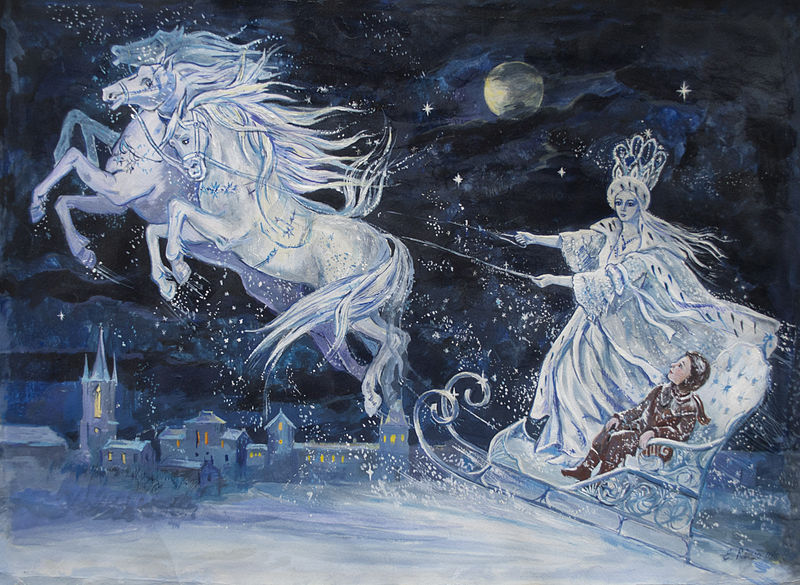Thursday
When I was a child, one of the fairy tales that most enthralled me was Hans Christian Andersen’s Snow Queen. I had an abridged version so didn’t read all seven stories that comprise it, but what I read has stuck with me. Today when I encounter accounts of immigrant children snatched from their parents and whisked away to strange surroundings, I think of the Snow Queen abducting little Kay and freezing his heart.
Playing the role of Snow Queen for us is Director of Homeland Security Kirstjen Nielsen, who actually has Danish ancestry—although to be fair, ripping children from their parents is not only her idea. (Trump, John Kelly, and Stephen Miller are all behind the draconian “zero tolerance” policy.) In the latest development of this horrifying saga, last week hundreds of children were transported, in the middle of the night, to a new tent city in Texas:
In shelters from Kansas to New York, hundreds of migrant children have been roused in the middle of the night in recent weeks and loaded onto buses with backpacks and snacks for a cross-country journey to their new home: a barren tent city on a sprawling patch of desert in West Texas.
Until now, most undocumented children being held by federal immigration authorities had been housed in private foster homes or shelters, sleeping two or three to a room. They received formal schooling and regular visits with legal representatives assigned to their immigration cases.
But in the rows of sand-colored tents in Tornillo, Tex., children in groups of 20, separated by gender, sleep lined up in bunks. There is no school: The children are given workbooks that they have no obligation to complete. Access to legal services is limited.
Undoubtedly you have seen a video clip of the child who, upon finally being reunited with his parents, did not recognize them and threw a fit. Something similar happens to Kay in Andersen’s story. The queen’s chilly kiss causes him to forget all about home:
“Are you still cold,” she asked, as she kissed him on the forehead. The kiss was colder than ice; it went quite through to his heart, which was already almost a lump of ice; he felt as if he were going to die, but only for a moment; he soon seemed quite well again, and did not notice the cold around him.
“My sledge! don’t forget my sledge,” was his first thought, and then he looked and saw that it was bound fast to one of the white chickens, which flew behind him with the sledge at its back. The Snow Queen kissed little Kay again, and by this time he had forgotten little Gerda, his grandmother, and all at home.
Child psychologists tell us that many of these children have been damaged for life and some may never see their parents again. Will Americans also forget, the way they appear to have forgotten, say, the botched hurricane response in Puerto Rico. Do these actions of unspeakable inhumanity just get buried by the next news cycle?
In the fairy tale, however, there is one person who refuses to forget. Kay’s playmate Gerda embarks on a journey to find out whether he is still alive and, if so, to bring him back. Most of the book is the story of this journey.
She finally finds Kay in Lapland, where he is
quite blue with cold, indeed almost black, but he did not feel it; for the Snow Queen had kissed away the icy shiverings, and his heart was already a lump of ice.
Gerda’s empathy, however, saves the day. Think of her as a bleeding heart liberal:
[S]he went on till she came to the large empty hall, and caught sight of Kay; she knew him directly; she flew to him and threw her arms round his neck, and held him fast, while she exclaimed, “Kay, dear little Kay, I have found you at last.”
But he sat quite still, stiff and cold.
Then little Gerda wept hot tears, which fell on his breast, and penetrated into his heart, and thawed the lump of ice, and washed away the little piece of glass which had stuck there. Then he looked at her, and she sang—
“Roses bloom and cease to be,
But we shall the Christ-child see.”
Then Kay burst into tears, and he wept so that the splinter of glass swam out of his eye. Then he recognized Gerda, and said, joyfully, “Gerda, dear little Gerda, where have you been all this time, and where have I been?” And he looked all around him, and said, “How cold it is, and how large and empty it all looks,” and he clung to Gerda, and she laughed and wept for joy…. Then Gerda kissed his cheeks, and they became blooming; and she kissed his eyes, and they shone like her own; she kissed his hands and his feet, and then he became quite healthy and cheerful.
Trump’s crime is not only snatching children from their parents, thereby causing untold damage. He is also freezing the hearts of a large swathe of Americans so that they forget their essential humanity.
The tears of Gerda must save us. Without them, we are emotional monsters.


